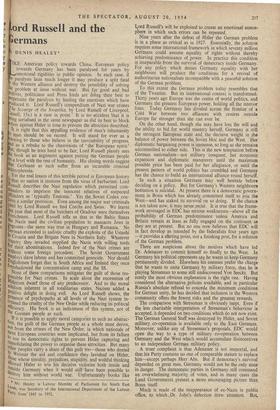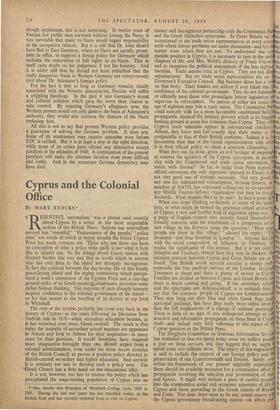ord Russell and the
ermans
DENIS HEALEY* EKE American policy towards China, European policy towards Germany has been paralysed for years by emotional rigidities in public opinion. In each case, if e paralysis lasts much longer it may produce a split fatal the Western alliance and destroy the possibility of solving problem at issue without war. But for good and bad otives, politicians and Press lords are doing their best to rPetuate the paralysis by feeding the emotions which have roduced it. Lord Russell's compendium of Nazi war crimes The Scourge of the Swastika, bx Lord Russell of Liverpool, assell, 15s.) is a case in point. It is no accident 'that it is env serialised in the same newspaper as did its best to block ction against Hitler in time to prevent the atrocities described. It is right that this appalling evidence of man's inhumanity 0 man should be on record. It will stand for ever as a arning to those who believe in the inevitability of progress, d as a rebuke to the chauvinists of ' the European spirit.' ut, though he tries hard to be fair, Lord Russell plainly sees Is book as an argument against putting the German people On a level with the rest of humanity. His closing words suggest that Gerhians as such suffer from an incurable criminal schizophrenia. , Yet the real lesson of this terrible period in European history '; that no nation is immune from the virus of barbarism. Lord nussell describes the Nazi regulation which permitted com- u'anders to imprison the innocent relatives of suspected genders as ' typically Teutonic.' Yet the Soviet Codex con- ,ins a similar provision. Even among the major war criminals fled by Lord Russell we find Czechs and Swiss. We learnt baSt year that most of the butchers of Oradour were themselves vrenchmen. Lord Russell tells us that in the Baltic States the Nazis used the civilian population to massacre Jews in tngroms—the same was true in Hungary and Rumania. No ernian exceeded in sadistic cruelty the exploits of the Ustashi 0 Croatia and the Brigate Nere in Northern Italy; Whatever tcoyitry they invaded supplied the Nazis with willing tools ;Or their abominations. Indeed few of the Nazi crimes are without some foreign precedent. The Soviet Government employs slave labour and has committed genocide. Nor should Englishmen forget that in South Africa and Ireland they once foreshadowed the concentration camp artd the SS. None of these comparisons mitigates the guilt of those res- onsible for Nazi crimes. In scale alone the enormities of IlEtlerism dwarf those of any predecessor. And to the moral nihilism inherent in all totalitarian states, Nazism added a Positive delight in doing evil. As Lord Russell shows, the Presence of psychopaths at all levels of the Nazi system in- creased the cruelty of the New Order while reducing its political the German His book is an indictment of this system, not of 4 41e German people as such. 4, If it is possible to apply moral categories to such an abstrac- 1100, the guilt of the German people as a whole must derive, not from the crimes of the New Order, in which nationals of most European countries were implicated, but from its failure to use its democratic rights to prevent Hitler capturing and consolidating the power to organise these atrocities. But many °tiler peoples carry a share of this guilt too—those who denied ta° Weimar the aid and confidence they lavished on Hitler, those whose timidity, prejudices, stupidity, and wishful thinking allowed Hitler to win his decisive victories both inside and destroy Germany when it would still have been .possible to uestroy him without world war. Unfortunately books like –.....___.
Leeds, Mr. Healey is Labour Member of Parliament for South East red3, was Secretary of the International Department of the Labour artY from • 1945 to 1952. Lord Russell's will be exploited to create an emotional atmos- ere in which such errors can be repeated.
Nine years after the defeat of Hitler the German problem is in a phase as critical as in 1927. Essentially, the solution requires some international framework in which seventy million Germans could assume equality of rights without thereby achieving predominance of power. In practice this condition is inseparable from the survival of democracy inside Germany. For any policy which denies Germany equality with her neighbours will produce the conditions for a revival of authoritarian nationalism incompatible with a peaceful solution of the German problem.
To this extent the German problem today resembles that of the Twenties. But its international context is transformed.
Thirty years ago Europe was the centre of world politics, and Germany the greatest European power, holding all the interior lines. Today Germany lies divided across the frontier of a Cold War between two alliances with centres outside Europe far stronger than she can ever be. On the other hand, though she may have lost the will and the ability to bid for world mastery herself, Germany is still the strongest European state and the decisive weight in _the balance of power between the Soviet bloc and the West. Her diplomatic bargaining power is immense, so long as she remains uncommitted to either side. This is the new temptation before German nationalism—not military conquest, but economic expansion and diplomatic manoeuvre until the maximum possible price has been paid for her allegiance, or until the present pattern of world politics has crumbled and Germany has the chance to build an international alliance round herself. 'In such a situation Germans may well hesitate before deciding on a policy. But for Germany's Western neighbours hesitation is suicidal. At present there is a democratic govern- ment in Bonn which has already committed itself to join the West—and has staked its survival on so doing. If the chance is not taken now, it may never recur. It is true that the frame- work envisaged in EDC has serious weaknesses—above all the probability of German predominance unless America and Britain remain at least as fully engaged on the continent as they are at present. But no one now believes that EDC will in fact develop as intended by the federalists four years ago —it provides a starting point, not a finishing post, for a solution of the German problem.
There are suspicions about the motives which have led Dr. Adenauer to commit himself so finally to the West. In Germany his political opponents say he wants to keep Germany permanently divided. Elsewhere his enemies prefer the charge that he wants to unite Germany by military force, that he is playing Streseman to some still undiscovered Von Seeckt. But surely the most obvious explanation is the right one. Having considered the alternative policies available, and in particular Russia's absolute refusal to concede the minimum conditions for German unity, he has decided that inclusion in the Western community offers the fewest risks and the greatest rewards.
The comparison with Streseman is obviously inept. Even if the less charitable interpretation of Streseman's behaviour is accepted, it depended on two conditions which do not now exist. The German General Staff was destroyed by Hitler, and Soviet military co-operation is available only to the East Germans. Moreover, unlike any of Streseman's proposals, EDC would open the way to a type of military co-operation between Germany and the West which would accumulate disincentives to an independent GernAan military policy. A truer complaint is that Adenauer is not immortal, and that his Party contains no one of comparable stature to replace him—except perhaps Herr Abs. But if democracy's survival depended on great men, Germany would not be the only state in danger. The democratic parties in Germany still command an overwhelming majority of votes, and in many cases the Land Governments present a more encouraging picture than Bonn itself.
Much is made of the reappearance of ex-Nazis in public office, to which ,Dr. John's defection drew attention. But, though' unpleasant, this is not surprising. In twelve years of Nazism few public men survived without joining the Party; it was inevitable that many ex-Nazis would regain responsibility as the occupation relaxed. But it is odd that Dr. John should have fled to East Germany, where ex-Nazis are equally promi- nent in office, to support a Soviet policy for Germany which includes the restoration of full rights to ex-Nazis. This in itself casts doubt on his judgement if not his honesty. And it is odder still that he should not have remarked that the really dangerous Nazis in Western Germany are conspicuously cool about Dr. Adenauer's foreign policy.
For the fact is that so long as Germany remains closely associated with the Western democracies, Nazism will suffer a crippling handicap. In the past it was Germany's moral and cultural isolation which gave the worst their chance to take control. By rejecting Germany's allegiance now, the Western powers would not only destroy the basis of Adenauer's authority, they would also increase the chances of the Nazis replacing him.
All this is not to say that present Western policy provides a guarantee of solving the German problem, It does not. Some of its weaknesses may, require attention even before EDC is ratified. But it is at least a step in the right direction, while none of its critics have offered any alternative except paralysis in the attitudes of 1949. A continuation of the present paralysis will make the ultimate decision even more difficult and costly. And in the meantime German democracy may have died.



































 Previous page
Previous page